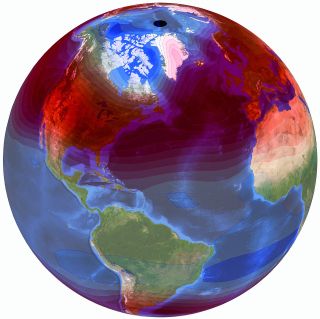Climate Change Strengthens Earth's 'Heartbeat' — and That's Bad News

It's no secret that human activity is changing the climate, and one new study shows how our influence is seriously affecting Earth's seasons and atmosphere.
Climate change is much more than rising temperatures and melting ice. In a new study, scientists from Lawrence Livermore National Laboratory (LLNL) and five otherorganizations show that human action significantly affects the seasonal temperature cycle in the troposphere, or lowest layer of Earth's atmosphere — the layer that we live in where weather occurs.
These researchers used what is known as a "fingerprint" technique, in which they separated human influence from natural influence on climate. This allowed them to isolate human contributions and assess the specific effects of our species. And, while many fingerprint studies explore climate patterns over years and decades, this work shows how humans influence the changing seasons. [See the Effects of Climate Change Across Earth (Video)]
In this new study, scientists examined seasonal temperature cycles in the troposphere and observed the profound impact humans are having on the atmosphere and our seasons. Most notably, the researchers found that because of carbon dioxide emissions, Earth's seasonal "heartbeat," or the contrast between hot summers and cold winters, is becoming stronger.
The team used temperature measurements taken by satellites to study changes in the size of the seasonal temperature cycle in the troposphere at different points on the planet's surface. In this way, the researchers could see the difference between summer and winter temperatures and the difference between warm and cold seasons.
The investigators found that our summers are warming more rapidly than the other seasons as Earth's overall temperature rises, a phenomenon that is especially true in the Northern Hemisphere. Additionally, the measured temperatures in the troposphere are consistent with models that suggest a strengthening seasonal heartbeat.
"Our results suggest that attribution studies with the changing seasonal cycle provide powerful and novel evidence for a significant human effect on Earth's climate," Benjamin Santer, LLNL climate scientist and lead author on the new work, said in a statement.
Get the Space.com Newsletter
Breaking space news, the latest updates on rocket launches, skywatching events and more!
Climate fingerprint research, which originated in the 1970's, studies climate patterns to find the source of large climate changes. It takes into account natural factors that contribute to climate like ocean heat, the water cycle, circulation in the atmosphere, sea ice, and extreme natural events, according to the statement. In this study, researchers studied model climate simulations driven by historical changes in human behavior.
The team found a highly significant "pattern match" between seasonal temperature trends and the human influence, or "fingerprint," on the troposphere, according to the statement. This shows that observed changes in our atmosphere and seasonal tropospheric temperature cycles are most likely caused by human action, the study said.
This is the first formal fingerprint study that has ever been conducted with the changing seasonal tropospheric temperature cycle, according to the statement.
This work was published July 20 in the journal Science.
Email Chelsea Gohd at cgohd@space.com or follow her @chelsea_gohd. Follow us @Spacedotcom, Facebook and Google+. Original article on Space.com.
Join our Space Forums to keep talking space on the latest missions, night sky and more! And if you have a news tip, correction or comment, let us know at: community@space.com.

Chelsea “Foxanne” Gohd joined Space.com in 2018 and is now a Senior Writer, writing about everything from climate change to planetary science and human spaceflight in both articles and on-camera in videos. With a degree in Public Health and biological sciences, Chelsea has written and worked for institutions including the American Museum of Natural History, Scientific American, Discover Magazine Blog, Astronomy Magazine and Live Science. When not writing, editing or filming something space-y, Chelsea "Foxanne" Gohd is writing music and performing as Foxanne, even launching a song to space in 2021 with Inspiration4. You can follow her on Twitter @chelsea_gohd and @foxannemusic.
